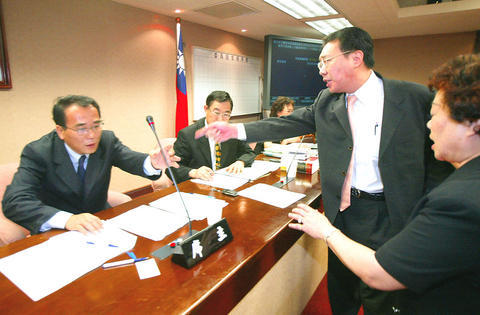The legislative Home and Nations Committee meeting adjourned early yesterday amid a near brawl and shouting by lawmakers over an amendment proposing to lift the ban on Taiwanese investment in high-tech items in China.
Chinese Nationalist Party (KMT) Legislator Lee Chi-chu (李紀珠) introduced an amendment to the Statute Governing Relations between the Peoples of the Taiwan Area and Mainland Area (台灣地區與大陸地區人民關係條例) that called for the lifting of restrictions on relocating certain technologies and materials from Taiwan to China.
The bill sparked immediate bickering between ruling and opposition party lawmakers.

PHOTO: CNA
The verbal sparring almost became physical when Taiwan Solidarity Union Legislator David Huang (黃適卓) discovered that executives from the electronics, semiconductor and petroleum sectors -- including Taiwan Semiconductor Manufacturing Co (TSMC), the world's largest contract chipmaker -- were in attendance.
Pounding a desk and screaming, Huang accused the committee convener, Non-Partisan Solidarity Union Legislator Tsai Hau (蔡豪), of ambushing pan-green lawmakers opposed to the bill by secretly inviting the executives to the meeting to influence its outcome.
"The KMT doesn't love Taiwan," Huang shouted. "It's trying to sell us out to China!"
"I'll be waiting outside the legislature for you later," Tsai threatened. "How about that?"
Sponsored by 44 pan-blue lawmakers, the bill seeks to alter Article 35 of the statute by allowing Taiwan-based businesses to relocate technologies related to mass production, especially of high-tech products, to China as long as the technologies are already in China and such transfers don't violate international rules on trade and transfers.
The bill would allow chipmakers to use 0.18-micron technology to manufacture chips in China, while other high-tech companies could transfer a range of now restricted components, including liquid-crystal-display panels, to China to ramp up mass production there, according to a Mainland Affairs Council statement.
The bill would lead to a disproportionate amount of investment flowing to China and a further hollowing out of the economy as the nation's production and technology shift to China, the council warned.
Local chipmakers are allowed to transfer currently restricted 0.18-micron technology to China to produce eight to 12-inch wafer fabs there, as long as the Ministry of Economic Affairs approves such transfers. However, the application process is typically long and arduous.
The council's statement also included a long list of restricted items, including chemical and biological agents and other sensitive technologies, that even Lee acknowledged should, "for the sake of national security, be subject to some restrictions on cross-strait investment and technical cooperation."
The 102 restricted items, the council said in its statement, account for a mere 1.42 percent of investment by the local manufacturing sector, and could have military applications. To date, Taiwan has already invested US$57.5 billion in China, a market now home to more than 55 percent of Taiwan's total overseas investment, it added.
"Overseas investment is already too concentrated in China, and that has led to some negative impact [on the nation]," it said.
The message from pan-blue lawmakers yesterday, however, was just the opposite.
"This bill is vital to give our manufacturers an edge and increase the nation's economic competitiveness," Lee said.
Current rules on technology transfers, the bill's sponsors said in a statement, are vague, outdated and the reason behind local businesses' losing out on vital market opportunities in China as the nation slips further into economic "malaise."

POSITIVE DEVELOPMENT: Japan and the US are expected to hold in-depth discussions on Taiwan-related issues during the meeting next month, Japanese sources said The holding of a Japan-US leaders’ meeting ahead of US President Donald Trump’s visit to China is positive news for Taiwan, former Japan-Taiwan Exchange Association representative Hiroyasu Izumi said yesterday. After the Liberal Democratic Party’s landslide victory in Japan’s House of Representatives election, Japanese Prime Minister Sanae Takaichi is scheduled to visit the US next month, where she is to meet with Trump ahead of the US president’s planned visit to China from March 31 to April 2 for a meeting with Chinese President Xi Jinping (習近平). Japan and the US are expected to hold in-depth discussions on Taiwan-related issues during the

‘LIKE-MINDED PARTNER’: Tako van Popta said it would be inappropriate to delay signing the deal with Taiwan because of China, adding he would promote the issue Canadian senators have stressed Taiwan’s importance for international trade and expressed enthusiasm for ensuring the Taiwan-Canada trade cooperation framework agreement is implemented this year. Representative to Canada Harry Tseng (曾厚仁) in an interview with the Central News Agency (CNA) said he was increasingly uneasy about Ottawa’s delays in signing the agreement, especially as Ottawa has warmed toward Beijing. There are “no negotiations left. Not only [is it] initialed, we have three versions of the text ready: English, French and Mandarin,” Tseng said. “That tells you how close we are to the final signature.” Tseng said that he hoped Canadian Prime Minister Mark Carney

President William Lai (賴清德) yesterday bestowed one of Taiwan’s highest honors on Saint Vincent and the Grenadines (SVG) Ambassador Andrea Clare Bowman in recognition of her contributions to bilateral ties. “By conferring the Order of Brilliant Star with Grand Cordon on Ambassador Bowman today, I want to sincerely thank her, on behalf of the Taiwanese people, for her outstanding contribution to deepening diplomatic ties between Taiwan and SVG,” Lai said at a ceremony held at the Presidential Office in Taipei. He noted that Bowman became SVG’s first ambassador to Taiwan in 2019 and

A man walks past elementary school artworks at the Taipei Lantern Festival in Ximen District yesterday, the first day of the event. The festival is to run from 5pm to 10pm through March 15.